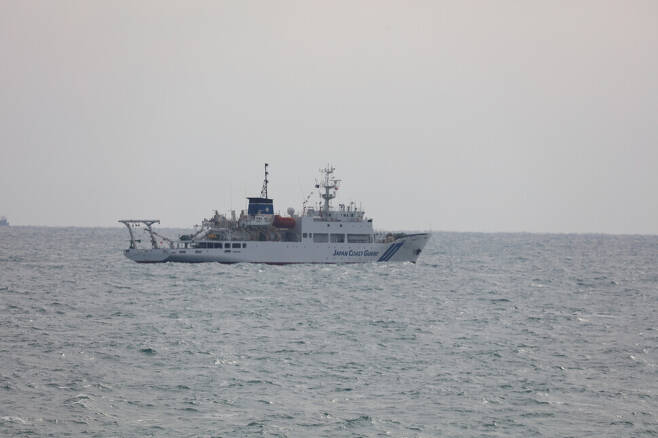S. Korean, Japanese coast guards face off in waters off Jeju for 3 straight days
전체 맥락을 이해하기 위해서는 본문 보기를 권장합니다.
On Jan. 12, the Korea Coast Guard (KCG) said, "We discovered a Japan Coast Guard (JCG) vessel in waters 70 nautical miles [around 126 km] southeast of Seogwipo, Jeju, at 11:45 pm on Jan. 10, and we have been demanding that it leave those waters."
South Korean Ministry of Foreign Affairs (MOFA) Spokesperson Choi Young-sam said the South Korean government was "engaged in legitimate ongoing law enforcement activities in waters that fall under South Korean government jurisdiction based on international law and related statutes."
이 글자크기로 변경됩니다.
(예시) 가장 빠른 뉴스가 있고 다양한 정보, 쌍방향 소통이 숨쉬는 다음뉴스를 만나보세요. 다음뉴스는 국내외 주요이슈와 실시간 속보, 문화생활 및 다양한 분야의 뉴스를 입체적으로 전달하고 있습니다.

The South Korean and Japanese coast guards faced off for three straight days, each claiming the waters off the southern end of Jeju Island as part of their own exclusive economic zone (EEZ).
This is a new source of conflict in a relationship already strained over a Korean court’s ruling on the Japanese military’s “comfort women” system.
On Jan. 12, the Korea Coast Guard (KCG) said, “We discovered a Japan Coast Guard (JCG) vessel in waters 70 nautical miles [around 126 km] southeast of Seogwipo, Jeju, at 11:45 pm on Jan. 10, and we have been demanding that it leave those waters.”
“The Coast Guard has dispatched a 3,000-ton ship, and as of 3 pm [today], we were observing the ship’s activities closely at a distance of three nautical miles [around 5 km],” it added.
A KCG official explained, “The South Korean and Japanese EEZs overlap in these waters. It’s supposed to be determined through diplomatic discussions, but both are now claiming them as their own waters.”
“We are engaging in legitimate activities in our own waters,” the official asserted.
On Jan. 11, Japan’s NHK network reported that “the Japan Coast Guard survey ship Shoyo was conducting a survey at a location around 140 kilometers west of Meshima at the western end of Nagasaki’s Goto Islands, which falls within Japan’s EEZ, when a KCG vessel began sending radio commands for it to halt its survey.”
According to the NHK, the KCG demanded that the vessel immediately suspend its survey, insisting that it “needed prior permission from the South Korean government to conduct scientific surveys in South Korean waters.” In response, the JCG maintained that it was “engaged in legitimate survey activities in Japan’s EEZ” and called on the KCG to “immediately cease its demands and move away from the vessel.” The network also said a similar run-in between the KCG and JCG had occurred last August.
South Korea and Japan have drawn borders for fishing based on their fisheries agreement, which entered into force in January 1999. But they have yet to reach an agreement on the EEZ borders due to conflicting territorial claims, including those related to Dokdo. According to the UN Convention on the Law of the Sea, countries may designate an EEZ extending 200 nautical miles from their respective coast. In cases like South Korea and Japan’s when their territories are adjacent, they are supposed to draw suitable borders in between based on discussions.
South Korean Ministry of Foreign Affairs (MOFA) Spokesperson Choi Young-sam said the South Korean government was “engaged in legitimate ongoing law enforcement activities in waters that fall under South Korean government jurisdiction based on international law and related statutes.”
“The relevant South Korean institutions have determined that the location of the Japanese vessel corresponds to South Korea’s Exclusive Economic Zone,” he explained.
A MOFA official acknowledged that Japan “has indeed protested this matter.”
“The South Korean government has stated that the waters are under our jurisdiction and that the [KCG’s] activities were legitimate, and demanded that Japan’s maritime survey activities be immediately suspended,” the official said.
But with Japan insisting that it plans to finish the survey as scheduled by February, the dispute is expected to continue.
Meanwhile, the KCG reported that the JCG ship had departed South Korean waters at 4:24 pm on Jan. 12.
By Gil Yun-hyung, staff reporter, and Lee Jung-ha, Incheon correspondent
Please direct comments or questions to [english@hani.co.kr]
Copyright © 한겨레. 무단전재 및 재배포 금지.
- 제주 카지노서 사라진 145억원 중 81억원 금고에서 발견
- ‘집합금지’ 어기고 5명 식사모임 가진 여자 프로배구 선수들
- 이만희 신천지 총회장 ‘코로나 방역 방해’ 무죄…횡령은 인정
- 나경원의 ‘독한’ 출마 선언…‘빠루 여장군’ 컨셉트가 통할까?
- [단독]“교수채용 대가로 2억?”…손종국 전 경기대 총장 고발
- 앉아 일하는 당신, 하루 11분 운동도 좋다…하루 35분이 어렵다면
- 15일 오전 6시부터 연말정산 간소화 서비스 시작
- 나라마다 ‘제각각’…중 시노백 코로나19 백신 효능 미스터리
- 상하목장 우유, 소비자들 ‘빨대 어택’에 응답했다
- 북한의 ‘자력갱생’ 노선은 언제부터 시작된 것일까요?